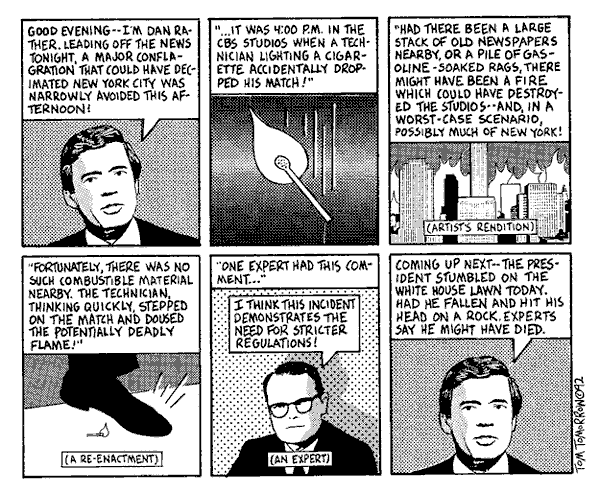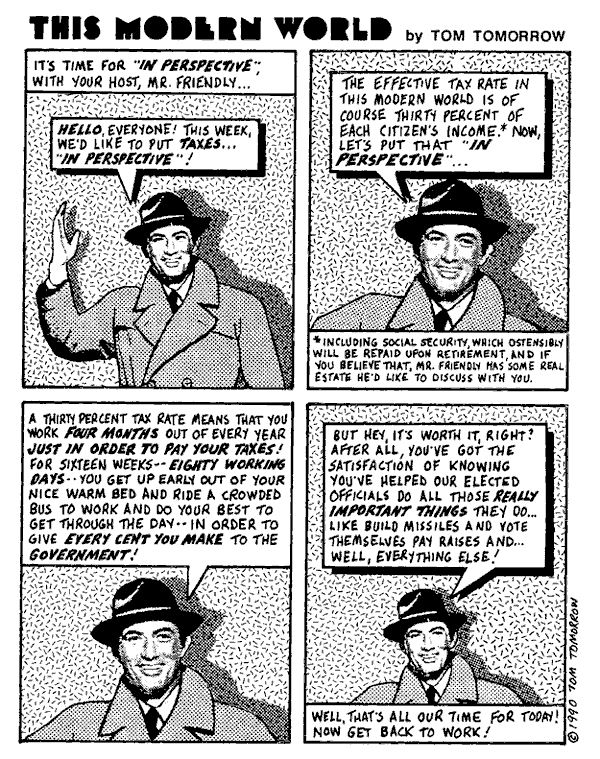You are aware, aren’t you,
… that those same labor laws which provide privileges to NLRB-recognized unions by forcing employers into collective-bargaining also heavily regulate the methods that NLRB-recognized unions can adopt, and the goals that they can achieve? That, for example, under Taft-Hartley, legally-recognized unions are forbidden from striking except under a limited range of government-approved conditions, that they are legally prohibited from establishing union hiring halls or freely negotiating a closed shop contract with employers, that in many states (under so-called “right to work” laws) they are legally prohibited from freely negotiating a union shop contract with employers, that they are legally prohibited from promoting secondary boycotts or engaging in secondary strikes (i.e. boycotts or strikes against a company for doing business with a second company workers have a grievance with; this prohibition effectively bans general strikes and mandates union scabbing), that strikes can be (and have been) broken by the arbitrary fiat of the President of the United States, etc., etc., etc.? In fact, while some factions of the labor movement (especially the AFL and the nascent CIO) actively lobbied for the Wagner Act and the system of state patronage that it created, other, more radical factions of the labor movement were stridently opposed to it, arguing (correctly) that Roosevelt’s plan was an effort to subsidize bureaucratic conservative unionism, and thus to capture and domesticate the labor movement. And predicting (accurately) that the practical consequences of the NLRB system would be to substantially hamstring the labor movement, and to benefit only a few fatcat union bosses, at the expense of rank-and-file workers.
… that for about half of its history (from the founding of the Knights of Labor in 1869 up to the Wagner Act in 1935), the American labor movement operated in a political and legal environment where it had no government recognition, no government privileges, and in fact was repeatedly, violently attacked by injunction-wielding judges, by the police, the military, by the U.S. Marshalls, by President Woodrow Wilson and Attorney General Alexander Mitchell Palmer and a young J. Edgar Hoover, by state militias, private “security” companies, and mobs? That radical unions like the IWW nevertheless managed to organize hundreds of thousands of workers in spite of this unrelenting violence and to win, without any use of government privilege, substantial victories in towns like Lawrence, Massachusetts and Spokane, Washington? I conclude that labor unions can be quite effective when based on free association and without government privilege.
If the conclusion you’re trying to urge here is just that the NLRB and the AFL-CIO are statist, well, sure. Who denies that? Certainly not the NLRB or the AFL-CIO, who candidly declare their allegiance to a big, interventionist government; and certainly not pro-union anarchists, either, who generally refer to establishment unionism as “labor fakirs” deserving nothing but scorn, and advocate for radical unions organized along quite different lines, and with quite different aims.
If, on the other hand, you’re trying to establish some more general conclusion, like (say) “Labor Unions and Freedom Don’t Mix,” or that “the state is the first weapon in the labor union’s arsenal to be wielded against employers and workers alike,” or that “the ultimate dream of the labor unions is to completely replace the existing state, allowing them to force their will on 100% of the people 100% of the time,” i.e., a claim about what labor unions per se do and want, rather than what a temporarily triumphant, government-subsidized faction within the labor movement does and wants, but which other, competing factions within the labor movement have repeatedly condemned, then I can’t say you’ve offered much by way of convincing evidence for that conclusion.
As for Bakunin and his followers, I certainly have my disagreements with Bakuninist collectivism. (That’s why I’m an individualist, or a mutualist, rather than a collectivist.) But you’re distorting their position. Bakunin’s idea of federated labor unions is not a replacement state. He believed that the best arrangement for society was a federated structure of workers’ and community associations. But he also believed in an absolute right to dissociate from any union or other association that one did not want to participate in or cooperate with. Thus: “[W]ithout certain absolutely essential conditions the practical realization of freedom will be forever impossible. These conditions are: . . . The internal reorganization of each country on the basis of the absolute freedom of individuals, of the productive associations, and of the communes. Necessity of recognizing the right of secession: every individual, every association, every commune, every region, every nation has the absolute right to self-determination, to associate or not to associate, to ally themselves with whomever they wish and repudiate their alliances without regard to so-called historic rights or the convenience of their neighbors.” (Revolutionary Catechism, 1866). Etc. Bakunin’s problems, such as they are, lie elsewhere. May I gently suggest that, if you want to find out Mikhail Bakunin’s views, you might be better off reading works by Mikhail Bakunin, rather than summaries of those works by Per Bylund?
As for Joe and his workers, I certainly agree that Joe should not be forced by the government (or by any form of violence) to engage in collective bargaining with the striking workers. However, I think you’re walloping on a strawman, as far as the worker’s demands go (do you know of any strike, even under the existing statist labor bureaucracy, in which workers demanded a 400% wage increase?); and I think you’re also pretty severely overestimating the ease of replacing 25%-40% of the workers on the shop floor all at once, especially if you’re trying to accomplish this without offering substantially higher wages or improved conditions. In real-world labor struggle, being in a position where you can get 25% or more of the workforce ready to just walk off the job often puts you in a very good position for getting substantial concessions from the boss.


 Anticopyright.
Anticopyright.